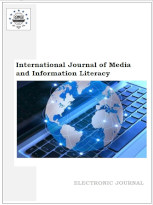Double-Blind Peer Review
Review Process
General Information
The "International Journal of Media and Information Literacy" review process is designed to ensure the highest academic quality and integrity standards. We aim to provide a fair, thorough, and timely review of all submitted manuscripts.
Criteria for Publication
To be considered for publication, a manuscript must meet the following criteria:
1. Scientific Merit: Provide strong evidence for its conclusions.
2. Originality: Present novel findings or perspectives.
3. Relevance: Be of significant importance to researchers in the field.
4. Interdisciplinary Interest: Ideally, be interesting to scholars in related disciplines.
Each submission must represent a meaningful advancement in its respective field and demonstrate why it deserves publication in our journal.
Initial Screening
Upon submission, all manuscripts are read by the editorial staff to determine their suitability for the journal. Manuscripts that do not meet the journal's editorial criteria or are deemed of insufficient interest are promptly rejected without external review.
Double-Blind Peer Review
Manuscripts that pass the initial screening are subjected to a double-blind peer review process, ensuring that both authors and reviewers remain anonymous to each other. This process minimizes bias and promotes impartiality.
Reviewer Selection:
– Reviewers are selected based on their expertise, reputation, and experience. The editorial team may consider recommendations from authors but retains the final decision on reviewer selection.
– Potential reviewers are contacted and asked to confirm their availability and suitability for the review. They are required to treat the manuscript and its content as confidential.
Conducting the Review:
– Reviewers are expected to provide a thorough, constructive, and unbiased evaluation of the manuscript.
– The primary goal is to assist the editors in making a decision and to offer guidance to authors on improving their work.
– Reviews should highlight the manuscript's strengths and weaknesses, provide detailed feedback, and offer suggestions for improvement.
– If a manuscript does not meet the journal's standards, reviewers should clearly explain their reasons for recommending rejection.
Anonymity:
– The journal maintains strict confidentiality regarding the identities of both authors and reviewers throughout the review process.
– Reviewers' identities are not disclosed to authors unless the reviewer explicitly requests it.
– Authors are required to remove any identifying information from their manuscripts to ensure anonymity.
Editorial Decision
Based on the reviewers' reports, the editors will make one of the following decisions:
Accept: The manuscript is accepted as it stands or with minor revisions.
Revise: The authors are invited to revise their manuscript to address specific concerns raised by the reviewers. Revised manuscripts may undergo further review.
Reject: The manuscript is rejected due to significant shortcomings or lack of novelty.
The decision is communicated to the authors, the reviewers' comments, and any additional guidance from the editors.
Ethical Considerations
The journal upholds the highest ethical standards in its review process. Editors may seek advice on any aspect of a paper that raises ethical concerns, such as data integrity, conflicts of interest, or the potential impact on society. All ethical issues are considered in the final decision to publish.
Appeals
Authors who believe that their manuscript was unfairly rejected may appeal the decision. Appeals must be submitted in writing to the Editor-in-Chief, providing detailed reasons for the appeal. The Editorial Board will review the appeal and make a final decision.
This Review Process Policy ensures that the "International Journal of Media and Information Literacy" maintains rigorous standards of scholarly excellence, transparency, and fairness.






